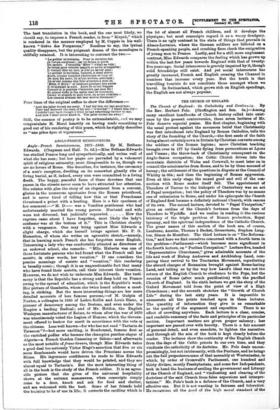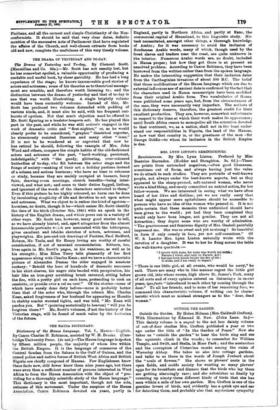THE CHURCH OF ENGLAND.
The Church of England: its Catholicity and Continu.,y. By the Rev. Herbert Pole. (Skeffington and Son. 5s.)—Among many excellent handbooks of Church history called into exist- ence by the present controversies, these seven lectures of Mr. Pole deserve especial praise. His first chapter, beginning with the usual protest against the erroneous belief that Christianity was first introduced into England by Roman Catholics, tells the story of the founding of the Church,—the first seeds of the faith being almost certainly sown in Britain by Christian converts among the soldiers of the Roman legions; more Christian teaching brought over in 177 by Gauls flying from persecutions at Lyons and Vienne ; the throw-back of Christianity consequent on the Anglo-Saxon occupation; the Celtic Church driven into the mountain districts of Wales and Cornwall, to meet later on in council the missionaries from Rome, and to be by them accused of heresy ; the settlement of the questions in dispute at the Council of Whitby in 664 ; and then the beginning of Roman aggression. Even at this early stage the mixed good and evil of the con- nection with Rome makes itself felt. The appointment of Theodore of Tarsus to the bishopric of Canterbury was an act of Papal usurpation ; but the policy of Theodore was by no means one of submission to Rome, and under his episcopate the Church of England first became a definitely national Church, with canons of its own. The second lecture, devoted to " Papal Usurpation," gives an outline of the Church's fortunes from the days of Theodore to Wycliffe. And we realise in reading it the curious intricacy of the triple problem of Roman protection, Royal tyranny, and the spiritual independence of the Catholic Church. The great names of this section of the book are, of course, Lanfranc, Anselm, Thomas it Becket, Orosseteste, Stephen Lang- ton, Simon de Montfort. The third lecture is on " The Reforma- tion," and here we find ourselves concerned with a fourth term in the problem—Parliament—which becomes more significant in the fourth lecture, on " Puritan Usurpation." Lecture five, headed "Representative Churchmen," gives admirable accounts of the life and work of Bishop Andrewes and Archbishop Laud, com- paring their revival to the Tractarian Movement, repudiating the absurd charges of Romanism brought against Rome-hating Laud, and telling us by the way how Laud's ideal was not the return of the English Church to obedience to the Pope, but the reunion of Rome (after much purification) with the purified Church of England. In the sixth lecture we get the story of the Oxford Movement told from the point of view of a High Churchman ; and the seventh sketches the "Growth of Church Life" during the last sixty years. It is impossible to enumerate all the points touched upon in these lectures. The quantity of information they give is as remarkable as the quality of the argument and exposition There is no effect of crowding anywhere. Each lecture is a clear, concise, and readable summary of the facts and principles of its particular section. Important matters are given proper saliency ; less important are passed over with brevity. There is a fair amount of personal detail, and even anecdote, to lighten the narrative. And through all the aim of the book is kept clearly before the reader. The lectures show the continuity of the English Church from the days of the Celtic priests to our own time, and they vindicate the catholicity of its doctrine. Mr. Pole deals uncom- promisingly, but not intolerantly, with the Puritans, and he brings out the full preposterousness of that assembly at Westminster, in which, by order of Cromwell's Parliament, one hundred and thirty divines, mostly Presbyterians, and some few Independents, took in hand the business of settling the government and Liturgy of the Church of England, and " vindicating and clearing of the doctrines of the said Church from false aspersions and interpre- tations." Mr. Pole's book is a defence of the Church, and a very effective one. But it is not wanting in fairness and toleration, He recognises all the good of the high moral standard of the
Puritans, and all the earnest and simple Christianity of the Non- conformists. It should be said that very clear dates, definite mention of the successive Acts of Parliament that have regulated the affairs of the Church, and well-chosen extracts from books old and new, complete the usefulness of this very timely volume.



















































 Previous page
Previous page